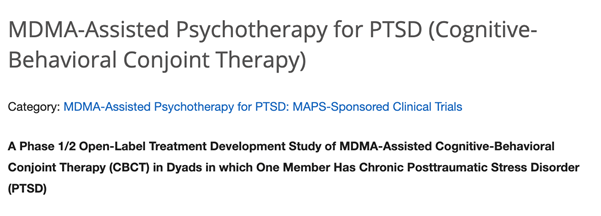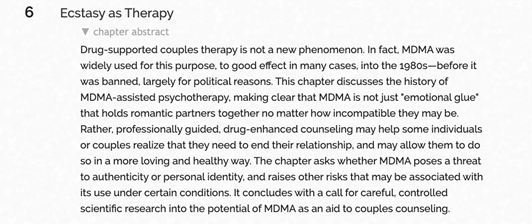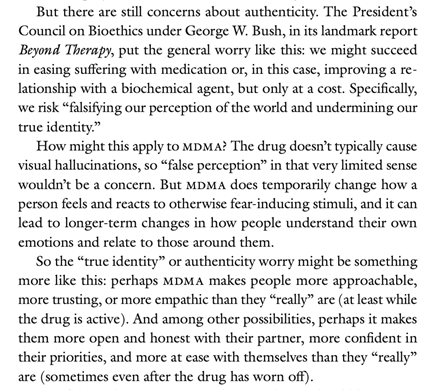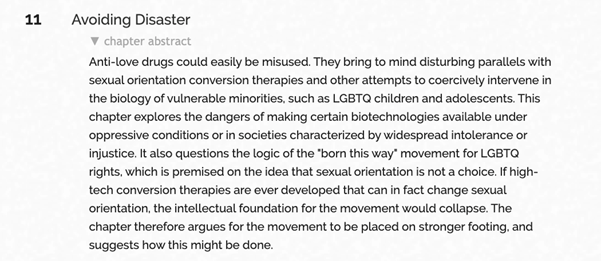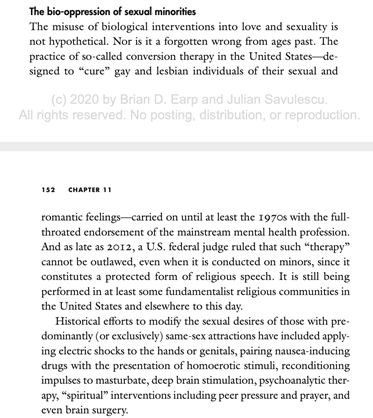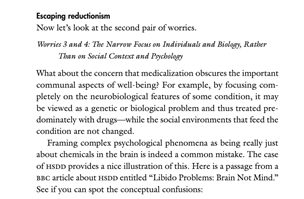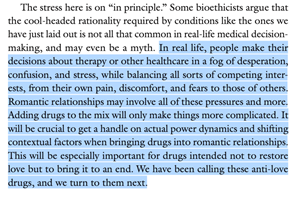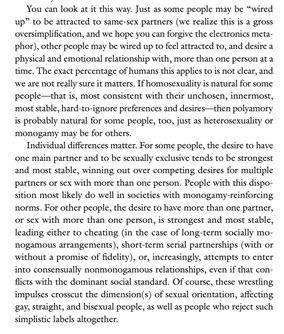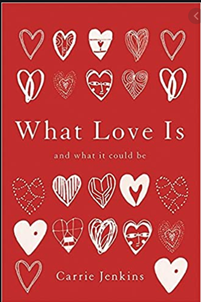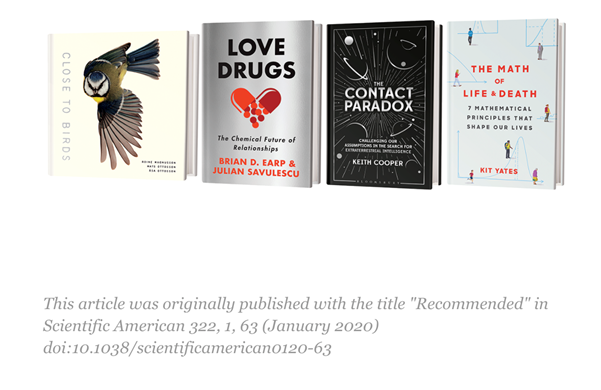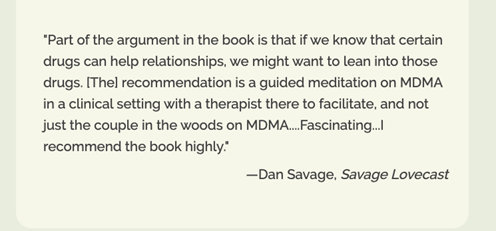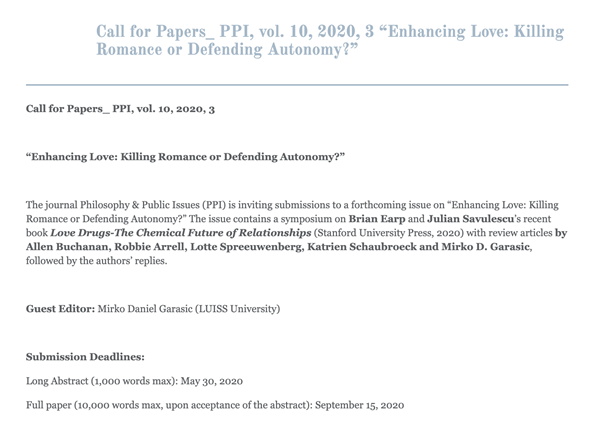It’s time for yet another event in our @blackwellbooks virtual festival – welcome to @briandavidearp who will be talking about his new book ‘Love is the Drug’, published by @ManchesterUP
https://blackwells.co.uk/bookshop/product/Love-Is-the-Drug-by-Brian-D-Earp-author-Julian-Savulescu-author/9781526145413
https://blackwells.co.uk/bookshop/... href="https://twtext.com//hashtag/BlackwellsVF"> #BlackwellsVF
https://blackwells.co.uk/bookshop/product/Love-Is-the-Drug-by-Brian-D-Earp-author-Julian-Savulescu-author/9781526145413
This event will be slightly different from our previous events. We will be tweeting Brian’s initial thoughts from this Twitter account, and then @briandavidearp will be on hand to answer any questions you might have.
#BlackwellsVF
#BlackwellsVF
Brian is one of the co-authors of ‘Love is the Drug’ alongside Julian Savelscu. Brian is Associate Director of the Yale-Hastings Program in Ethics & Health Policy at Yale Uni & Research Fellow in the Uehiro Centre for Practical Ethics at the University of Oxford. #BlackwellsVF
His work is cross-disciplinary, following training in philosophy, cognitive science, psychology, history and sociology of science and medicine, and ethics.
#BlackwellsVF
#BlackwellsVF
‘Love is the Drug’ is a fascinating book..What if there were a pill for love? Or an anti-love drug, designed to help us break up? This controversial and timely book argues that medical advances have brought chemical control of our romantic lives within our grasp #BlackwellsVF
Rich in anecdotal evidence and case-studies, the book offers an insight into cutting-edge medical research that could have profound effects on us. Will relationships be the same in the future? Will we still marry? What does the future of love look like?
#BlackwellsVF
#BlackwellsVF
Hello! I& #39;m Brian Earp, co-author w. @juliansavulescu of the new book "Love is the Drug: The Chemical Future of Our Relationships" ( @ManchesterUP; published in US as "Love Drugs: The Chemical Future of Relationships" by @stanfordpress). I& #39;d like to introduce you to our book :)
I thought I would start by saying what our book is NOT. Our book is not a pro-drug manifesto. In fact, the original working title for our book was "Brave New Love" - an allusion to Aldous Huxley& #39;s dystopic novel about drugs promoting inauthentic emotions to control the masses:
Our book is also NOT about & #39;magical& #39; love potions or science fiction speculation. It& #39;s about real-world chemicals available today that *already* affect our romantic relationships, often in ways that may be very harmful. This includes SSRI-based drugs used for antidepressants:
A major thesis of the book is we should not just study individual-level effects of drugs on particular symptoms we intend to treat in clinical trials. Rather, we need to understand the full RANGE of effects drugs can have, including potentially harmful effects on relationships:
We also explore the recent "Psychedelic Renaissance" in medicine, where drugs like psilocybin from magic mushrooms, as well as MDMA [not technically a psychedelic] are being used as adjuncts to psychotherapy for, e.g., post-traumatic stress disorder (PTSD) https://tinyurl.com/rx6o795 ">https://tinyurl.com/rx6o795&q...
The same principle, we suggest, applies here. PTSD (post-traumatic stress disorder) has serious *interpersonal* effects -- & so may drug-assisted psychotherapy, as researchers are beginning to explore ( https://maps.org/conjoint-therapy).">https://maps.org/conjoint-... We call for a & #39;relational shift& #39; in this science
The more we understand interpersonal (and other) effects of commonly used drugs like SSRIs, & newer drugs like psychedelics (at least as used in medicine), the better we can identify situations where love & relationships might be harmed, or even potentially, in some cases, helped
Yet this raises all kinds of philosophical and ethical questions: if & #39;love& #39; can be affected by a drug, is it really love? What *is* love, anyway? Are drug-mediated experiences inauthentic? What makes a drug & #39;medicine& #39; vs. non-medicine? Should love-affecting drugs be banned?
This points to important social & policy questions: Won& #39;t "Big Pharma" want to capitalize on people& #39;s insecurities around love & sex to pathologize ordinary human relationships (& heartbreak)? Will & #39;high-tech& #39; gay conversion therapies be developed? These are HUGE worries ...
In fact, these kinds of worries are a major reason we wrote this book: We want 2 start a public conversation about the current (& likely future) reality of drugs that affect love, sex, & relationships so we can decide together as society how to prepare for this & head off dangers
Along the way, we discuss even deeper questions, about human nature, sexual orientation, and personal identity (often taking a biopsychosocial approach & arguing against neuro-reductionism), & highlight issues around (abuses of) power and structural injustices in relationships
And we explore the evolving nature of (often technologically-mediated) contemporary relationships, including norms re: sex, dating, commitment & marriage. Is monogamy becoming a thing of the past? Should polyamory be more widely accepted? What should our values be in modern love?
If you want to get a sense of some of the content, there are chapter excerpts available online at @stanfordpress. Here, for example, we set-up our discussion of the & #39;dual-nature& #39; theory of love, borrowing & building on the excellent work of @carriejenkins https://www.sup.org/books/extra/?id=27130&i=Chapter%202%20Excerpt.html">https://www.sup.org/books/ext...
We also break down the literature on oxytocin, often called the "love hormone" or "cuddle chemical" - as we explain, the situation is much more complicated than popular discussions of oxytocin suggest, & many original findings don& #39;t seem to replicate https://www.sup.org/books/extra/?id=27130&i=Chapter%208%20Excerpt.html">https://www.sup.org/books/ext...
For some initial, thoughtful reviews of the book, you can check out this one from @TheAtlantic ( https://www.theatlantic.com/family/archive/2020/01/should-marriage-therapists-give-couples-mdma/605059/),">https://www.theatlantic.com/family/ar... or this one from @philosopher1923 ( https://www.thephilosopher1923.org/review-earp-savulescu).">https://www.thephilosopher1923.org/review-ea... Also we were proud our book was picked as an Editor& #39;s Choice by Scientific American @sciam!
There are a number of awesome podcasts you can check out as well, for example this interview w. @fakedansavage ( https://www.savagelovecast.com/episodes/699#.XpaEGlNKi1s);">https://www.savagelovecast.com/episodes/... this with @rosiewilby ( https://play.acast.com/s/thebreakupmonologues/fc873eeb-cb67-472c-ac33-bab05c58d086);">https://play.acast.com/s/thebrea... with @JohnDanaher ( …https://philosophicaldisquisitions.blogspot.com/2020/02/68-earp-on-ethics-of-love-drugs.html);">https://philosophicaldisquisitions.blogspot.com/2020/02/6... or with @EricROlson ( https://podcasts.apple.com/us/podcast/16-love-drugs-and-ethics-with-bioethicist-brian-d-earp/id1437453231?i=1000465966637)">https://podcasts.apple.com/us/podcas...
Finally for the more academic types among you, @mdgarasic
has put out a CALL 4 PAPERS for journal Philosophy & Public Issues, which is doing a special symposium on the book, w commentaries by Allen Buchanan & others & eventual reply by me&@juliansavulescu http://fqp.luiss.it/2020/03/22/call-for-papers_-ppi-vol-10-2020-3-enhancing-love-killing-romance-or-defending-autonomy/">https://fqp.luiss.it/2020/03/2...
has put out a CALL 4 PAPERS for journal Philosophy & Public Issues, which is doing a special symposium on the book, w commentaries by Allen Buchanan & others & eventual reply by me&@juliansavulescu http://fqp.luiss.it/2020/03/22/call-for-papers_-ppi-vol-10-2020-3-enhancing-love-killing-romance-or-defending-autonomy/">https://fqp.luiss.it/2020/03/2...
That concludes the Twitter thread from @briandavidearp
Many thanks David. And a reminder to everyone that & #39;Love is the Drug& #39; can be browsed and bought here: https://blackwells.co.uk/bookshop/product/Love-Is-the-Drug-by-Brian-D-Earp-author-Julian-Savulescu-author/9781526145413">https://blackwells.co.uk/bookshop/...
Many thanks David. And a reminder to everyone that & #39;Love is the Drug& #39; can be browsed and bought here: https://blackwells.co.uk/bookshop/product/Love-Is-the-Drug-by-Brian-D-Earp-author-Julian-Savulescu-author/9781526145413">https://blackwells.co.uk/bookshop/...
We now open up the event to questions, so if you& #39;d like to ask @briandavidearp anything, or make any observations, please go ahead!

 Read on Twitter
Read on Twitter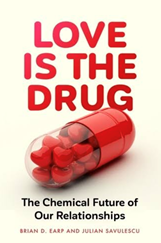

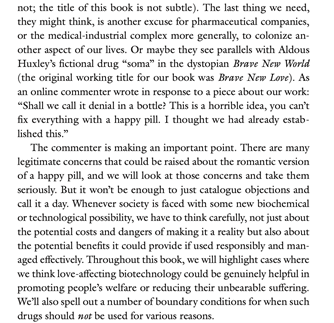

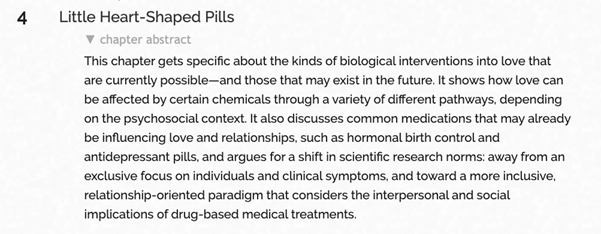
![We also explore the recent "Psychedelic Renaissance" in medicine, where drugs like psilocybin from magic mushrooms, as well as MDMA [not technically a psychedelic] are being used as adjuncts to psychotherapy for, e.g., post-traumatic stress disorder (PTSD) https://tinyurl.com/rx6o795&q... We also explore the recent "Psychedelic Renaissance" in medicine, where drugs like psilocybin from magic mushrooms, as well as MDMA [not technically a psychedelic] are being used as adjuncts to psychotherapy for, e.g., post-traumatic stress disorder (PTSD) https://tinyurl.com/rx6o795&q...](https://pbs.twimg.com/media/EVp14ZuU0AAAx3d.png)
